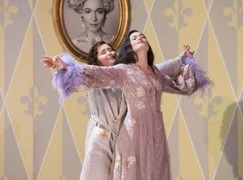Singers in uproar over critical body insults at Glyndebourne
mainAndrew Clark in the FT refers to a singer as ‘a chubby bundle of puppy-fat.’
Michael Church in the Independent sniffs at ‘a dumpy girl’. Andrew Clements in the Guardian calls her ‘stocky’.
‘Unbelievable, unsightly and unappealing’, writes Richard Morrison in the Times.
Rupert Christiansen in the Telegraph calls one singer ‘dumpy’ and another ‘stressed by motherhood’ (how would he know?).
The boys – late-middleaged men, actually – were having fun at the expense of a beautiful young singer (pictured), an artist whose self-image could be seriously damaged by such mindless assaults. This was a slurry of sexist attitudes masquerading as music criticism, and the singing community are not taking it lying down.

Social media have gone white-hot with their fury.
Here are some anonymous samples:
– Just been reading the reviews of rosenkavalier at glyndebourne. Shame on every critic who wrote such cutting remarks about x’s physique. Shame on you. Congratulations on crushing yet another young woman’s self esteem.
– There’s a real anger from musicians towards the Glyndebourne Rosenkav reviews and their hideous, overly personal comments.
– Open mouthed shock reading the Glyndebourne Rosenkav reviews. Such personal hateful comments on a singer’s body. Totally deplorable.
– Tired of reading schlock headlines & casual, outrageous sexism from critics.
– “Chubby bundle of puppy fat”- who the xxx do you think you are? Could she sing it is that not relevant?
– I am sick of reading this kind of nonsense from critics who have experienced nothing and know even less. I currently teach many young singers who are increasingly suffering body dysmorphia anxiety because of exactly this kind of thing.
– I think it’s amazingly irresponsible of someone like Christiansen, who ought to know more about the bigger picture of being a singer. It does seem that he has free rein these days to say whatever he wants. His blinkered and sustained attack on ENO over the last few years has been pretty astonishing.
… and more, much more.
Slippedisc has just published an open letter on voice and image by one of Britain’s foremost opera singers, the mezzo-soprano Alice Coote. Click here to read Alice.

UPDATE: What the newspapers should do now. Click here.





Comments